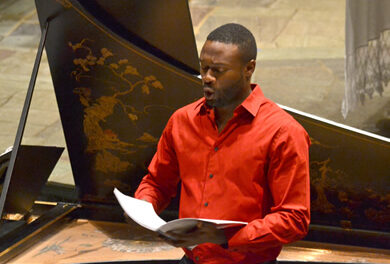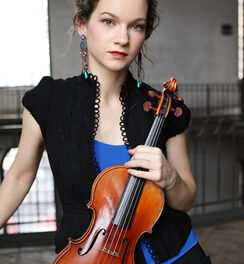Raleigh, NC, actor, director, and set and costume designer extraordinaire John C. McIlwee strikes theatrical gold with a 24-karat Hot Summer Nights at the Kennedy presentation of The Last Night of Ballyhoo. In his day job as director of University Theatre at N.C. State, McIlwee has worked many miracles with collegiate and TheatreFest productions at NCSU’s Thompson Theatre and Stewart Theatre. With a bigger budget and a cast of professional actors, the proverbial sky is the limit for McIlwee, who not only coaxed crackerjack comic characterizations from each and every cast member, but worked wonders with their wardrobe while doubling as the show’s costume designer.
The only hitch in a virtually flawless opening-night performance July 19th was a sliding door that wouldn’t slide. There was a crunch of splintering wood as the actor that this problem impeded boldly swept the stuck door aside, so he could make his only slightly belated entrance. Likewise, director and costume designer McIlwee — whom Triangle Theater Review has saluted many times as a Renaissance man of theater — swept all the literal and figurative obstacles away to make this Hot Summer Nights at the Kennedy production the hottest ticket in a scorching summer. Not only that, but McIlwee clad the show’s female characters in an awesome array of chic fashions, circa 1939, and one hilarious recreation of an elaborate gown that saucy Scarlette O’Hara might have worn to an ante-bellum ball. The men were nicely dressed, too; but it is the women that McIlwee turned into clotheshorses. They absolutely shimmered in the spotlight.
Hilary Russo, who serves as publicist for the Hot Summer Nights at the Kennedy series, takes an onstage role as Lala Levy in The Last Night of Ballyhoo; and she gives, perhaps, the performance of her young and very, very promising career as a poor, silly dreamer whose daily deceptions of her family and friends and, most of all, herself are about to be exposed in a painfully public way. Sweet, sensitive Lala dropped out of college during her first term at the University of Michigan, because of problems she had while rushing the Jewish sorority on campus. Now, Lala mostly mopes about the house; and when she’s asked what she’s doing these days, she claims to be writing a historical novel set in the same era and locations as fellow Atlanta resident Margaret Mitchell’s Gone with the Wind. Instead, Lala goes to the movies, particularly the Clark Gable/Vivien Leigh version of GWTW that’s premiering in Atlanta at the time of the play.
Lala is a plum part; and Hilary Russo devours it with obvious relish, much to the delight of last night’s audience, who gave the show a well-deserved standing ovation at the final curtain. Marilee Spell brings similar gusto to her role as Beulah “Boo” Levy, Lala’s obstreperous domineering mother who openly and loudly expresses her opinions on a variety of ticklish subjects. Her prejudices, as a Jew of German ancestry, against “the other kind” of Jews who came from Eastern Europe are typical of the undercurrent of internalized anti-Semitism that keeps The Last Night of Ballyhoo from being just another romantic comedy.
Pulitzer Prize winning playwright Alfred Uhry (Driving Miss Daisy) brilliantly combines a comedy of manners with a message play here. The Last Night of Ballyhoo will keep Triangle audiences laughing, but leave them with a lump in their throat as they exit the Kennedy Theater.
Robin Dorff gives a pip of a performance as Boo Levy’s long-suffering brother Adolph Freitag, who heads the family bedding business and unwittingly precipitates Boo’s latest tirades against “the other kind” when he hires Joe Farkas (Brendan Bradley), a Brooklyn Jew of Eastern European ancestry as his assistant. Whereas Dorff is splendid as a straight man to Hilary Russo, Marilee Spell, and cohorts, Carolyn McKenna is quietly stealing scene after scene with her superbly understated performance as Rebecca “Reba” Freitag, a good-hearted if scatterbrained soul who’s constantly thwarting Boo Levy’s wish to rule the Freitag-Levy-Freitag roost without interference from her sister-in-law Reba or brother Adolph.
New York actor and Durham native Brendan Bradley is fantastic as Joe Farkas, the damn Yankee that not even Boo Levy can intimidate with her fierce glares or her fulminations; and University of North Carolina at Chapel Hill senior Susan Huckle is terrific as Sunny Freitag, the sheltered Wellesley College student who’s reading the polemical prose of Upton Sinclair and W.E.B. DuBois but completely unaware of the antipathy of American Jews from Germany to their fellow religionists from Eastern Europe. Bradley and Huckle have great chemistry, and the budding romance between Joe and Sunny is a delight to watch.
Like the long-awaited Gentleman Caller in Tennessee Williams’ Glass Menagerie, Edward Freeman’s character, Sylvan “Peachy” Weil, arrives late but leaves an indelible impression. From the very first appearance of his hideous shock of red hair in the doorway to the Freitag-Levy-Freitag household, Freeman puts a fine polish on his second-act cameo, as the irresponsible, irrepressible scion of a prominent Louisiana family and inveterate practical joker. Peachy’s high spirits are contagious to the other characters and the audience as well, and his obvious delight in mercilessly teasing Lala Levy hides his genuine affection for the poor lost girl, unhappily adrift alone in her own dream world.
In addition to John McIlwee’s smart staging, the best ensemble work of 2006 to date, and the fabulous assortment of period fashions that McIlwee devised to dazzle the eye, this Hot Summer Nights presentation of The Last Night of Ballyhoo greatly benefits from the technical wizardry of sound designer Brian L. Hunt, who skillfully inserts snippets of vintage songs in all the right places, and the excellent job that technical director and set and lighting designer Curtis Lee Jones does in creating the posh living and dining rooms of the well-to-do, blended, and highly assimilated Freitag-Levy-Freitag family in impressive detail, complete with a Christmas tree(!). Jones also designed a couple of clever insets for two crucial train scenes and the all-important showdown scene at the dance that concludes Atlanta’s annual Ballyhoo celebration where socially prominent Jewish young people from across the South come to look for possible mates.
With its delightful blend of romantic comedy and a timely lesson on the corrosive effects of prejudice — religious, racial, ethnic, etc .— on the human soul, The Last Night of Ballyhoo is a play to remember — and cherish — and few local productions in this or any other year are likely to top this uproarious Hot Summer Nights at the Kennedy rendition, under the direction of John McIlwee.
Hot Summer Nights at the Kennedy presents The Last Night of Ballyhoo Wednesday-Saturday, July 19-22 and 26-29, at 8 p.m. and Sunday, July 23 and 30, at 3 p.m. in the Kennedy Theater in the Progress Energy Center for the Performing Arts, 2 E. South St., Raleigh, North Carolina. $25, with senior and group discounts available. Note: There will be a cast talk-back after the July 23rd performance. Progress Energy Box Office: 919/831-6060. Hot Summer Nights at the Kennedy: http://www.hotsummernightsatthekennedy.org/lastnightofballyhoo.htm [inactive 5/07]. Internet Broadway Database: http://www.ibdb.com/show.asp?ID=5263.












